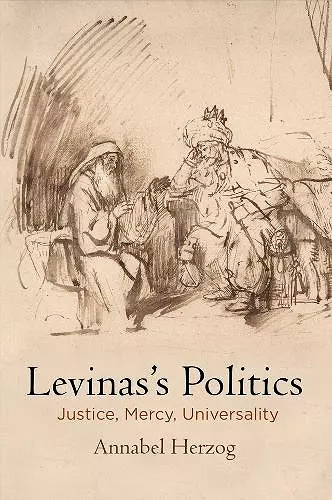Levinas's Politics
Justice, Mercy, Universality
Format:Hardback
Publisher:University of Pennsylvania Press
Published:13th Mar '20
Currently unavailable, and unfortunately no date known when it will be back

In Levinas's Politics, Annabel Herzog argues that Levinas's Talmudic readings embody a political pragmatism which complements, revises, and challenges the ethical analyses he offers in his phenomenological works.
A compelling account of politics and social philosophy in Levinas's Talmudic commentaries
Emmanuel Levinas (1906-1995) was a French philosopher known for his radical ethics and for his contribution to Jewish thought in his commentaries on Talmudic sources. In Levinas's Politics, Annabel Herzog confronts a major difficulty in Levinas's philosophy: the relationship between ethics and politics. Levinas's ethics describes the encounter with the other, that is, with any other human being. For Levinas, the face-to-face encounter is a relationship in which the ego is commanded by a transcendent and unquestionable order to take responsibility for the other person. Politics, on the other hand, presupposes at least three people: the ego, the other, and any third party. Among three people, nothing can be transcendent; on the contrary, everything must be negotiated.
Against the conventional view of Levinas's conception of the political as the interruption and collapse of the ethical, Herzog argues that in the Talmudic readings, Levinas constructed politics positively. She shows that Levinas's Talmudic readings embody a pragmatism that complements, revises, and challenges the extreme ethical analyses he offers in his phenomenological works—Totality and Infinity, Otherwise than Being, and Of God Who Comes to Mind. Her analysis illuminates Levinas's explanations of the relationship between ethics and politics: ethics is the foundation of justice; justice contains a necessary violence that must be moderated by mercy; and justice, general laws, and national aspirations must be linked in an attempt to "improve universality itself."
"More than any other scholar to date, Herzog has succeeded in dispelling the false idea that Levinas’s thought has nothing to contribute to the field of political philosophy. Indeed, Herzog has not only clearly shown that Levinas’s Talmudic texts do present a coherent political philosophy, but even one that is potentially valuable in highlighting the many tensions and opportunities of contemporary, Western liberal democracies. For these reasons, but also for its clarity, depth, and scholarly richness, Levinas’s Politics deserves to find a wide and attentive readership among Levinas scholars and political philosophers alike." * Phenomenological Reviews *
"[There is little doubt that Herzog’s strong reading of Levinas will bring new attention to the question of Levinas’s understanding of politics and political life, and her claim that the talmudic readings function as the political counterpart to Levinas’s philosophical ethics is a thesis that will decisively shape the next round of the debate." * Journal of Modern Jewish Studies *
"Herzog's latest book is impressive and significant. It is not too much to say that this book should change the way in which we understand Levinas’s philosophical output; and it does so explicitly by developing his distinct approach to politics, at least in European—'continental'—philosophical circles, from the undertheorized and underexplored so-called Talmudic writings...In Levinas’s Politics, Herzog shows how important the Talmudic writings are to Levinas’s overall project (and to his engagement with politics more broadly), and in doing so, she also reveals how certain features of Levinas’s thought are misunderstood without this necessary supplement." * Political Theory *
"Critics of Levinas's ethics as apolitical, anti-political, or even irrelevant for politics should be silenced once and for all by Annabel Herzog's fascinating, rich, and compelling account of politics and social philosophy in Levinas's Talmudic commentaries and other occasional writings. Herzog exhibits a consummate grasp of Levinas's thought and tells a subtle story about the way Levinas wrestles with the complexities of, and interactions between, ethics, politics, and social thought. The book is also a delight to read. Herzog has given us one of the most illuminating and important books on Levinas in many years." * Michael Morgan, Indiana University *
"What do we make of Levinas's ethics if there is no politics in his thought? Annabel Herzog's beautifully written and cogently argued book addresses precisely this question and answers that his work does contain a politics, albeit one that's easy to miss. Turning to Levinas's Talmudic readings, Herzog shows that it is in these writings that Levinas explores the relationship between his 'ethics as first philosophy' and his commitment to the political. With her exhaustive scholarship and distinctive interpretation of Levinas's corpus, Herzog has given us a book that will be required reading for anyone working on Levinas, Continental philosophy, or postwar Jewish intellectual history." * Claire Katz, Texas A&M University *
"Levinas's Politics is an original intervention in political philosophy as well as an excellent read. Annabel Herzog, in virtue of her talents as a leading political theorist, is well positioned to explicate the compelling principles at the heart of what seems to be Jewish religious discourse." * Samuel Moyn, Yale University *
- Winner of Winner of the Jordan Schnitzer Book Award in the Philosophy and Jewish Thought category, granted by the Association for Jewish Studies 2021 (United States)
ISBN: 9780812251975
Dimensions: unknown
Weight: unknown
208 pages